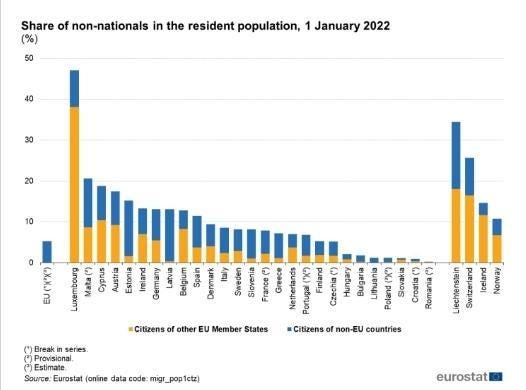The Futures - No. 32
The universal translation revolution / Europe adopting stricter immigration policies / Creating the first space baby
In this issue
The Quantumrun team shares actionable trend insights about how AI-powered translation services are changing global communication, the EU rethinking its immigration systems, stablecoins promoting financial inclusion in the Global South, and the Dutch startup aiming to birth the first space babies.
Future signals to watch
Dutch startup Spaceborn United is conducting research to conceive an embryo in space with the goal of one day enabling natural conception and birth in partial gravity environments like those found on the Moon and Mars.
Stablecoins and cryptocurrencies are enabling financial inclusion and dollarization in the Global South. The trend towards dollarization, where people favor assets like USDC over traditional currency, allows individuals to work for global internet-based companies and build wealth in stable digital currencies.
Swiss Federal Institute of Technology scientists inserted an implant in the spinal cord of a man with Parkinson’s disease, enabling him to walk again.
President Joe Biden revealed a federal commitment of USD $1.3 billion to construct three new interstate power lines to modernize the US electric grid and shift towards renewable energy.
Microsoft's research team has significantly upgraded one of its smaller large language models, demonstrating that more cost-effective AI technologies can possess capabilities similar to those of OpenAI's extensive GPT-4.
Also, OpenAI is going full steam ahead on GPT-5, using training data from both the Internet and private companies. That said, they recently fired their CEO, Sam Altman … and three days later, Microsoft hired him.
Apparently, thousands of potential patients have lined up to receive one of Neuralink’s brain implants.
Culturally // Trending
YouTube → The Garfield Movie // X → 2023 Grammy Nominations // Reddit → Hood versus roof // TikTok → Katana Chinchilla // Instagram → Mesmerizing northern lights // Spotify → “Standing Next To You”
💡 Watch Quantumrun’s trend videos on Linkedin & YouTube & Instagram & TikTok
🗣️ Real-time translation is changing global communication

The emergence of real-time universal translation technology is enabling seamless cross-language conversations.
As high-speed internet connectivity expands worldwide, this maturing innovation will make traveling/navigating foreign environments more accessible and cross-cultural interactions less daunting. In other words, this invisible innovation has the potential to break down traditional communication barriers, redefine international business collaboration, and foster a more inclusive global community. (Kind of like how the humans and aliens in Star Trek/Wars shows all magically spoke English.)
ElevenLabs' AI voice dubbing offers translation across 29 languages in seconds, including voice translation, speaker detection, and audio dubbing. Meanwhile, Google Pixel Buds, equipped with real-time translation, lets users hear spoken language translated right in their ear, along with a transcript on their phone.
Samsung is introducing a new phase of Galaxy AI for its 2024 S24 smartphones, emphasizing a blend of on-device and cloud-based AI that enhances the user experience while ensuring security and privacy. A key feature, "AI Live Translate Call," will be integrated into Samsung's phone app, offering real-time audio and text translations during calls, utilizing on-device processing.
Finally, AI startup Humane unveiled a USD $699 AI Pin, a wearable device designed to replace smartphones with features like voice-controlled calls, texts, and a laser display for visual information. The pin also offers real-time language translation, photo/video capture, and interaction with large language models.

Actionable trend insights as AI services enable real-time translation
For entrepreneurs
Entrepreneurs and small agencies will soon gain new tools to personalize their image/graphic and video advertisements to prospective clients by profile and by language, enhancing global reach and relevance by meeting diverse tastes and cultural expectations.
Entrepreneurs will experience fewer difficulties with their international expansions as next-generation translation tools lower the costs of conducting sales, market research, legal document drafting, etc.
For corporate innovators
Companies can hire more diverse teams across countries to collaborate seamlessly on projects by using AI-powered tools to provide real-time translation during virtual meetings, collaborative sessions, and document sharing. In effect, companies can more freely hire the best talent around the world without (or with fewer) language barrier concerns.
Supply chain management could become more efficient as communication with suppliers, manufacturers, and distributors from different language backgrounds becomes smoother. This can lead to better negotiation, faster problem resolution, and more effective supply chain strategies.
For public sector innovators
Public sector entities, particularly those involved in international aid and disaster response, can utilize AI-powered translation services to ensure that instructions, safety information, and coordination efforts are clearly understood by diverse groups of responders, volunteers, and affected populations.
Government agencies and hospitals can also use these translation tools to improve public service provision to new immigrants or refugees who have yet to learn their host country's language.
Trending research reports from the World Wide Web
According to the World Energy Outlook 2023, electric vehicles now constitute one in five cars sold, significantly up from one in 25 in 2020. In addition, over 500 GW of new renewable energy capacity is expected to be added this year, setting a record.
Harvard Business Review discusses the four major forces changing the labor market, including gen AI and a new generation of progressive workers.
Andreessen Horowitz argues that should banks adopt a unified set of open-source projects for API development and maintain these projects across thousands of global banks, it would greatly enhance the accessibility and interconnectedness of the world's financial ecosystem.
President Joe Biden released an executive order on how AI should be governed and developed in the US.
Nature gives a detailed overview of the developments in brain-reading technology.
🧳 Is Europe turning its back on immigration?

Amid rising concerns over security and social integration, many European nations are reevaluating their immigration policies. In 2015, the EU faced an unprecedented surge in irregular migration, with over 1.8 million illegal border crossings recorded by Frontex, the EU's border agency. This situation led to widespread panic among the public in several EU nations, as well as the implementation of stricter border controls.
The influx of migrants also led to housing crises in several EU nations. The UK, for example, has been using around 400 hotels across England, Scotland, Wales, and Northern Ireland for migrant accommodation, costing taxpayers £8 million per day. Plans to terminate these costly hotel contracts are underway, indicating a reduction in asylum claims.
In Germany, under Chancellor Angela Merkel's leadership, over 1.2 million refugees and asylum seekers were accepted between 2015 and 2016. However, the current government under Chancellor Olaf Scholz has adopted a stricter stance, emphasizing the need for more efficient deportation processes.
Meanwhile, the Nordic regions, renowned for their socio-economic stability, are now facing challenges in assimilating immigrants, particularly in Sweden. Amidst a backdrop of violence and gang-related crime, Sweden's Prime Minister has considered the involvement of the military to tackle this escalating concern.

The June 2023 overhaul of the EU's asylum procedures aims to distribute asylum seekers more evenly across member states, allowing countries to contribute financially instead of accepting migrants. However, this reform has faced opposition from countries like Hungary and Poland. As Europe grapples with these challenges, it becomes evident that its approach to immigration is not just a matter of border control but also a complex interplay of humanitarian obligations, demographic changes, social integration concerns, and political dynamics that will likely worsen throughout the 2020s.
Actionable trend insights as Europe implements stricter migrant policies
For public sector innovators
Local governments can initiate 'smart city' projects that specifically cater to the needs arising from stricter immigration policies. For instance, they could develop multi-use urban spaces that can swiftly transform based on the influx or reduction of migrant populations. These spaces could serve as temporary housing, cultural integration centers, or pop-up job training facilities equipped with modular designs and smart technology.
Government agencies will also have to review their housing supply, workforce needs, and immigrant integration services to better measure whether there is domestic capacity to accommodate an influx of migrants. Ineffective planning of these factors can indirectly contribute to the growth of xenophobic and nationalist sentiment.
Outside curiosities
Watch New York surgeons conduct the first whole-eye transplant on a human.
Vox covers retail theft from the perspective of the shoplifters.
This robot has an interesting way of bowling a strike.
This is not your normal kids’ summer camp (or is it?).
Developers in Florida are building hurricane-resistant properties.
More from Quantumrun
Read more daily trend reporting on Quantumrun.com
Subscribe to the Quantumrun Trends Platform (free for premium newsletter subscribers).
Corporate readers can review our Trend Intelligence Platform
Email us at contact@quantumrun.com with questions or feedback.
Finally, share your thoughts in the Substack comments below. We love hearing from you!
David Tal, Quantumrun President: Interested in collaborating with the Quantumrun Foresight team? Learn more about us here.
See you in The Futures,
Quantumrun



